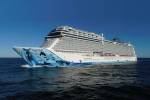Happy cruising means following basic health practices
Take a boatload of fun-seeking passengers out to sea, add a touch of norovirus, and what do you get a day or two later?
The worst vacation anybody ever has experienced.
It seems that, every week, news comes of another cruise somewhere being hit by a fast-traveling epidemic of gastrointestinal illness. And, notes Nancy Menzel, a registered nurse, public health specialist and associate professor at the University of Nevada, Las Vegas School of Nursing, the usual culprit is norovirus, which is “basically a land-based disease.”
“Most of the places you see (norovirus) outbreaks are in hospitals, nursing homes and day care centers,” Menzel says. However, the nature of a cruise ship — essentially a compact, isolated floating city of a few hundred inhabitants — makes it a hospitable breeding ground for norovirus.
Norovirus also has “a very short period of incubation before you get sick, so you can get sick 24 hours after being exposed to norovirus,” Menzel says. A traveler easily can bring norovirus on board even before the boat sets out to sea and spread it to other passengers after departure via a handshake, handrails, buffet utensils — imagine, Menzel says, “picking up tongs that 200 other people have handled” — or the use of public restrooms on board.
“So, you can see there’s a great possibility of spreading this,” Menzel says.
Menzel suggests that, before booking a cruise, travelers check out the U.S. Centers for Disease Control and Prevention’s Vessel Sanitation Program (http://www.cdc.gov/nceh/vsp). By following the link to “Green Sheet Reports” a traveler can obtain scores of the most recent inspections of specific ships. Then, Menzel recommends, stay off of any ship with a score of 85 or lower.
After that, click on the name of the ship to get specifics about its last inspection. And, while you’re there, check out other ships operated by the cruise line and see if you detect a pattern about how well a company does, or doesn’t, follow proper health and sanitation procedures.
Norovirus typically is spread by hand-to-mouth contact, Menzel says. During your cruise, wash your hands often and avoid touching your mouth.
Make frequent use of hand sanitizer dispensers, although unless sanitizers are alcohol-based, “they’re not effective against norovirus. And even if they are alcohol-based, they’re nowhere near as effective as handwashing.”
Be particularly careful when touching public surfaces such as handrails, and use the bathroom in your own cabin, rather than public restrooms.
If you do contract norovirus, “really, there is no treatment,” Menzel says. “It’s a virus. You can’t take antibiotics. You should report it to the medical staff on board, and they’ll advise you to drink plenty of fluids, which is difficult to do when you’re vomiting and have diarrhea. But the biggest danger is dehydration, and people who are most at risk are the elderly and children and those who aren’t in the best condition.”
Meanwhile, try to keep your immune system healthy by following good health practices during your cruise.
“Don’t gorge at the buffet, don’t overdrink, get some good sleep and keep your immune system functioning,” Menzel says.




























